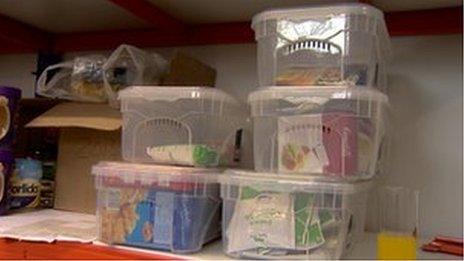Record numbers use Scottish food banks
- Published
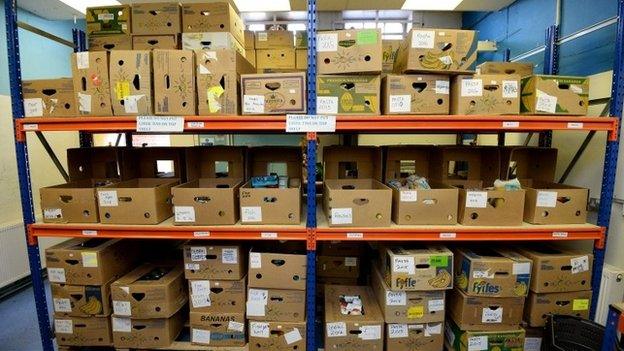
Trussell Trust food banks were visited by 10,489 people in December 2014 - a third of them were children
A record number of adults and children relied upon food banks in Scotland in December, according to new figures obtained by the BBC.
Nearly 10,500 people visited the Trussell Trust's 48 food banks for the first time in the charity's history.
The data also reveals a third of users cited low income - and not welfare benefit delays - for their predicament.
The figure is a 13% increase from the 9,263 people who used a Trussell Trust food bank in December 2013.
BBC Scotland wants your help in compiling a definitive list of all the food banks in Scotland. Please take just one minute to fill out this short form, external with details of your local food bank(s).
In December 2014, 10,489 people visiting Scottish food banks were given a three day supply of nutritionally balanced food by the charity - a third of them children.
The charity underlined that the final figure for December visits is likely to be even higher as food bank staff continue to input data into their system.
'Harrowing accounts'
Ewan Gurr, the charity's network manager for Scotland, said he was concerned that many low income families were forced to face hunger in the run-up to Christmas due to financial difficulties.
He said: "Every day we are hearing working people describe the devastating reality of sustaining their families with static incomes and unstable employment against consistently rising costs of essentials like food and rent.
"In the most harrowing accounts, we hear from the families choosing whether to prioritise heating their homes or feeding their families and parents losing weight because they overlook their own health and wellbeing to feed their children."
The Trust, which partners with churches and communities, currently operates more than 1,200 food distribution centres across the UK.
The number of people using their Scotland-based food banks increased by 398% between 2012/13 and 2013/14.
However, Northern Ireland and the North East of England have seen even larger increases during the same timeframe (489% and 463% respectively).
The Trust's figures also reveal Dundee had the highest number of adults (3,750) using food banks in the last year, while south east Glasgow had the highest number of children (1,975).
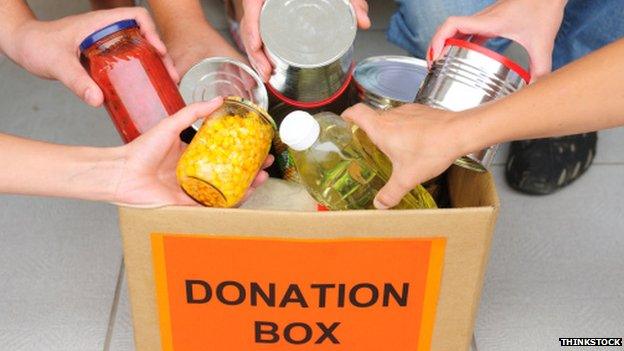
The number of people using their Scotland-based food banks has increased by 398% between 2012/13 and 2013/14.
A scoping study funded by the Scottish government, external in 2013 to provide insight into the extent of food aid provision in Scotland, reported that Trussell Trust's data is a good indicator of general provision and demand trends and reasons for demand experienced by other providers of food parcels.
The study recognised that there are many non-Trust food banks - they account for only 20% of all food centres in Glasgow - but that there is no definitive list of Scottish food banks.
Mr Gurr said: "We must accept that the rising need for emergency food in Scotland is unacceptable and the long-term reduction of food poverty must be a priority for policy makers across the spectrum."
The Scottish government blamed welfare changes and other policies introduced by the UK government.
Alex Neil, the Cabinet Secretary for Social Justice, Communities and Pensioners' Rights, said many people in work rely on benefits.
He added: "The massive increase in food banks is primarily due to the low wage economy we are living in and the benefits changes that have been introduced by Westminster.
"What we need is a living wage across the country, and a benefits system that keeps people out of poverty instead of putting people into poverty."
But the UK government insisted it was working to reduce poverty.
A spokesman for the Department for Work and Pensions said: "The UK Government spends £94bn a year on working age benefits to provide a safety net to support millions of people who are unemployed or on low incomes so they can meet their basic needs.
"Reforms to welfare are designed to bring fairness back to the system and help people into work - 52,000 more people are now in jobs in Scotland compared to this time last year, giving more people the peace of mind and security that comes with a steady income."
Falling incomes
For the first time in 2014, 3,005 people (28%) said they used a Scottish food bank due to low income in December, closely followed by 2,527 (24%) because of a benefit delay, and 1,555 (15%) due to a benefit change.
The Clyde, Avon and Nethan food bank reported that 77% of people given a food package in December cited low income as the main contributing factor.
Many users visiting the food banks at Airdrie and Lochaber also blamed low incomes (50% and 48% respectively).
However, this compared to 5% at the Alness and Invergordon food bank, where 74% attributed the need for food parcels to changes in their benefits.
But while the charity has attributed the rise in low income-related need for food banks, at a time of year when costs such as heating are higher, a government document published last month, external suggested low income families may face increasing financial difficulties in the future.
According to the report, approximately 820,000 people were living in relative poverty in 2013 - an increase of 110,000 from the previous year.
This increase in relative poverty - where someone lives in a household that receives less than 60% of the UK average income - was attributed to a continued fall in incomes.
The report concluded: "Low wage growth (particularly for those in less skilled employment), changes in the labour market, and tightening of eligibility and conditionality under welfare reform have resulted in lower median income."

By the numbers: The Trussell Trust
In 2011, there was one Trussell Trust food bank in Scotland - as of November 2014, there are 48 in 27 Scottish local authorities;
Between 2011 and 2013, Scotland experienced faster growth in the number of food banks launching with the Trust than any other region in the United Kingdom;
73,732 people received a three-day supply of emergency food between April and December 2014 - 30% of the recipients were children;
Everyone who comes to a Trussell Trust foodbank is referred by a professional such as a social worker, health visitor or schools liaison officer. More than 27,000 professionals referred people to Trussell Trust foodbanks in 2013-14, and 50% are statutory agencies;
More than 90% of food given out by Trussell Trust foodbanks is donated by the public;
An estimated 30,000 people volunteered with a Trussell Trust foodbank in 2013-14.
- Published16 January 2015
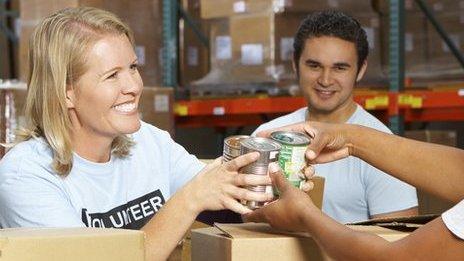
- Published11 August 2014
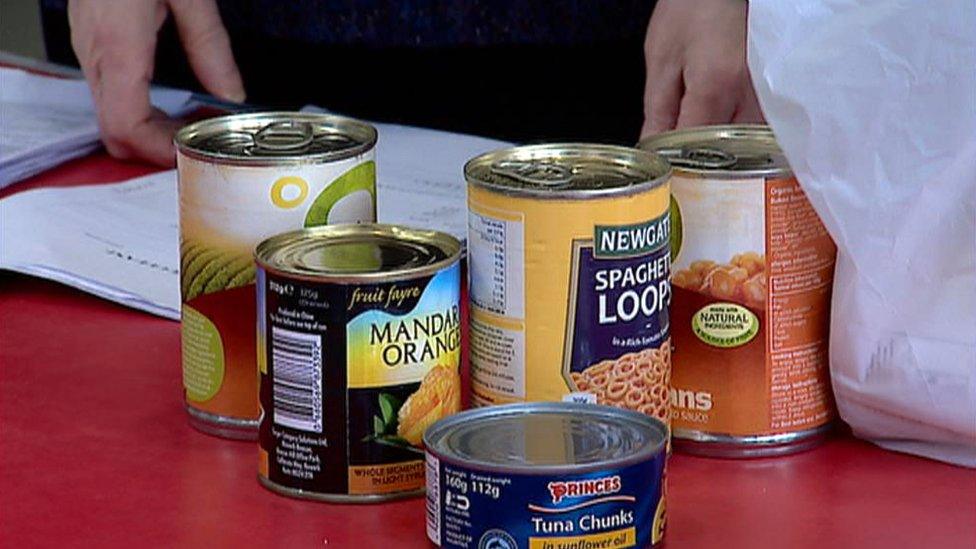
- Published28 April 2012
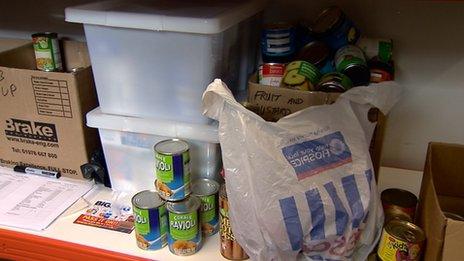
- Published28 April 2012
